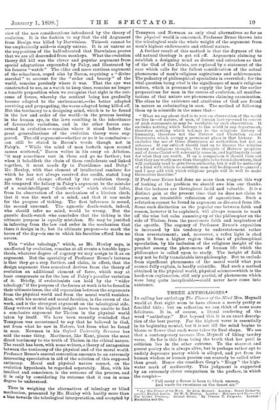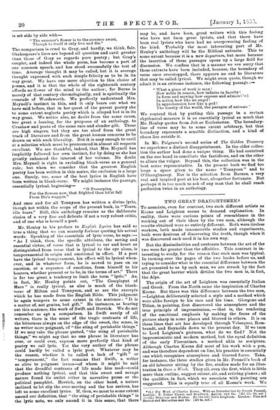THREE ANTHOLOGIES.*
IN calling her anthology The Flower of the Mind Mrs. Meynell would at first sight seem to have chosen a merely pretty or fanciful title ; but on reflection we can think of none more felicitous. It is, of course, a literal rendering of the word "anthology." But beyond this it is an exact descrip- tion of the best poetry. For the highest verse is essentially in its beginning mental, but it is not till the mind begins to bloom or flower that such verse takes its final shape. We see that a contemporary accuses Mrs. Meynell of liking tawdry verse. So far is this from being the truth that her peril in criticism lies in the other extreme. To the sheerest and purest poetry she is always alive, but is perhaps rather apt to unduly deprecate poetry which is alloyed, and yet from its human wisdom or human passion can scarcely be called other than great. Hence she considers Gray's " Elegy " the high- water mark of mediocrity. This judgment is supported by an extremely clever comparison in the preface, in which the couplet- " Full many a flower is born to blush unseen,
And waste its sweetness on the desert air,"
• (1.) The Flower of the Mind. By Alice Meynell. London Grant Richard& —(2%.) English Lurice. By W. E. Henley. London : Methuen and Clo.-13.) The Golden Treasury. Second Series. By Francis T. PalgraTe. London; Macmillan and Co. is set side by side with- " The summer's flower is to the summer sweet, Though to itself it only live and die."
The comparison is cruel to Gray, and hardly, we think, fair. Shakespeare's lines are beyond all question and cavil greater than those of Gray as regards pure poetry ; but Gray's couplet, and indeed the whole poem, has become a part of
our common speech. and has stood successfully the test of time. Average thought it may be called, but it is average thought expressed with such simple felicity as to be in its
way great. We have one more objection to this choice of poems, and it is that the whole of the eighteenth century
affords no flower of the mind to the author; for Burns is merely of that century chronologically, and is spiritually the comrade of Wordsworth. We perfectly understand Mrs. Meynell's instinct in this, and it only bears out what we have said before, that in her quest of the purest poetry she to some extent neglects poetry which is alloyed but is in its
way great. We notice also, no doubt from the same cause, too great a leaning, for the purposes of an anthology, to Crashaw and poets of the same rare and slender gift. These are high singers, but they are too aloof from the great track of literature and from the great human concerns to be drawn on with such liberality. But it is easy enough to cavil
at a selection which must be pronounced in almost all respects excellent. We are thankful, indeed, that Mrs. Meynell has implicitly followed her own instinct, for by doing so she has greatly enhanced the interest of her volume. No doubt Mrs. Meynell is right in excluding blank-verse as a general rule; but when we consider that the greatest English poetry has been written in this metre, the exclusion is a large one. Surely, too, some of the best lyrics in English have been written in blank-verse. We might instance the passage,
essentially lyrical, beginning— "0 Proserpina,
For the flowers now, that frighted thou let'st fall From Dis's waggon."
And once and for all Tennyson has written a divine lyric, though not within the scope of the present book, in 'Tears, idle tears." Still, this anthology remains as the deliberate choice of a very fine and delicate if not a very robust critic, and of one who is herself a poet.
Mr. Henley in his preface to English Lyrics has said so true a thing that we can scarcely forbear quoting his actual words. Speaking of the essentials of lyric verse, he says :—
" As I think, then, the specific attribute, the saving and essential virtue, of verse that is lyrical to ear and heart as distinguished from verse that is lyrical to the eye alone, is temperamental in origin and emotional in effect. If a poet have the lyrical temperament, his effect will be lyrical when- ever, and in whatever form, he is moved to pass on an emotion, or a sequence of emotions, from himself to his hearers, whether present or to be, in the terms of art." There is far too great a tendency to limit the term "lyric." As, in fact, Mr. Henley points out, "The Complaynt of Mars" is really lyrical, as also is much of the blank- verse of Milton and Tennyson, and so are the excerpts which he has made from the English Bible. This judgment he again tempers to some extent in the sentence : "It is a matter of, not genius, but gift." He instances, as bearing out this sentence, the work of Swift and Herrick. We do not remember so apt a comparison. In Swift surely of all writers, there is the sense of the tragic contrasts of life, the bitterness always on the edge of the sweet, the sense, in no writer more poignant, of "the sting of perishable things." If we may take the phrase quoted, "the sting of perishable things," we might say that no one phrase in literature has ever, or could ever, express more perfectly that kind of poetry we call lyric. Yet the very author of the phrase could hardly be called a lyric poet. Whatever may be the reason, whether it be called a lack of " gift " or "temperament," the fact remains that Swift, a writer
so alive to poignant issues—of whom it might be said that the dreadful contrasts of life made him mad—could
produce nothing lyrical, and that this sweet and savage nature found its outlet either in narrative prose or the political pamphlet. Herrick, on the other hand, a nature inclined to let slip the over-moving and the too serious, has
left us some excellent lyrics. If, then, we must to some extent amend our definition, that "the sting of perishable things" is the lyric note, we only amend it in this sense, that there
may be, and have been, great writers with this feeling who have not been great lyrists, and that there have been real lyrists who have had no overpowering feeling of the kind. rrobably the most interesting part of Mr. Henley's anthology will be the Biblical extracts. This to some extent because it is a new departure, but more because the insertion of these passages opens up a large field for discussion. We confess that in a manner we are sorry that these extracts have been included, because, the boundary of verse once overstepped, there appears no end to literature that may be called lyrical. We might even quote, though we
admit it is an extreme instance, the following passage :--•
"What a piece of work is man !
How noble in reason how infinite in faculty!
In form and moving how express and admirably f;
In action how like an angel!
In apprehension how like a god ! The beauty of the world, the paragon of animalio."
We contend that by putting this passage in a certain rhythmical measure it is as essentially lyrical as much that Mr. Henley quotes from Job or Ecclesiastes. The boundary. line of verse may be to some extent arbitrary, but that
boundary represents a sensible distinction, and a kind of chaos lies outside it.
In Mr. Palgrave's second series of The Golden Treasury we experience a distinct disappointment. In the older collec- tion the author had done a unique thing. He had contrived on the one hand to conciliate the fastidious, and on the other
to allure the vulgar. Beyond this, the collection was in the best sense representative. In the present book we find too large a space given to the name " Tennyson " and to O'Shaughnessy. Nor is the selection from Barnes, a very real and inspired poet at his best, altogether fortunate. But perhaps it is too much to ask of any man that he shall reach perfection twice in an anthology.











































 Previous page
Previous page